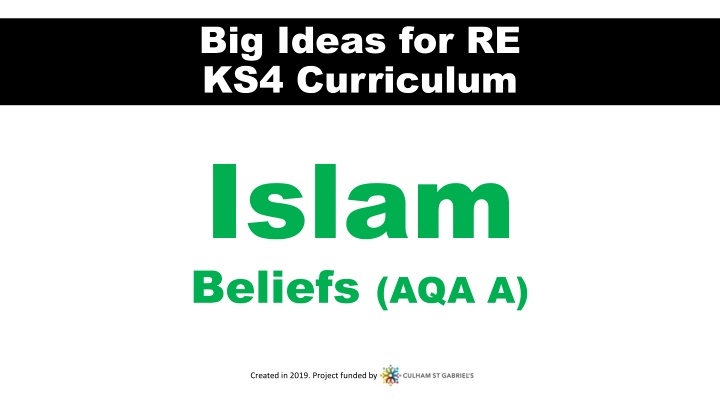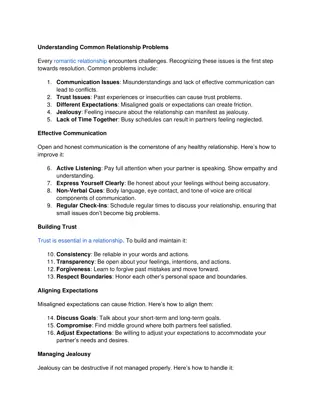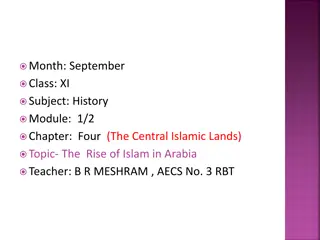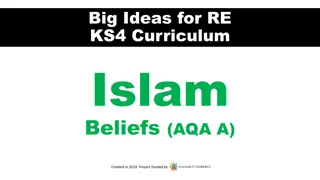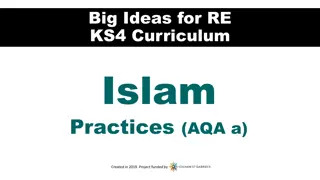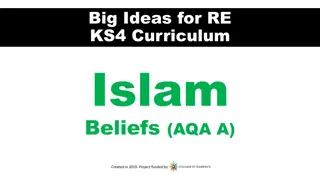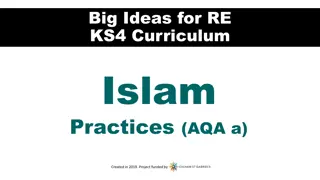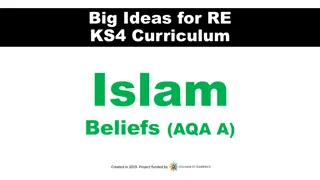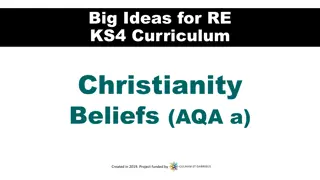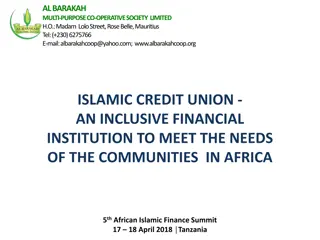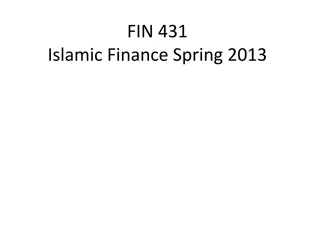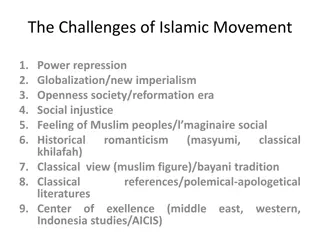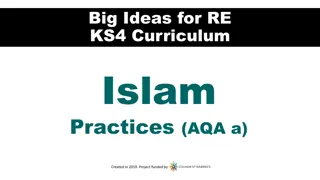Key Concepts in Islamic Beliefs for RE KS4 Curriculum
Explore the core beliefs of Islam, including the nature of prophethood, the significance of key prophets like Adam, Ibrahim, and Muhammad, the nature of God in Islam, the importance of the Qur'an as revealed scripture, and the role of angels in Islamic teachings. Delve into the diverse interpretations and philosophical questions surrounding these key concepts.
Download Presentation

Please find below an Image/Link to download the presentation.
The content on the website is provided AS IS for your information and personal use only. It may not be sold, licensed, or shared on other websites without obtaining consent from the author.If you encounter any issues during the download, it is possible that the publisher has removed the file from their server.
You are allowed to download the files provided on this website for personal or commercial use, subject to the condition that they are used lawfully. All files are the property of their respective owners.
The content on the website is provided AS IS for your information and personal use only. It may not be sold, licensed, or shared on other websites without obtaining consent from the author.
E N D
Presentation Transcript
Big Ideas for RE KS4 Curriculum Islam Beliefs (AQA A) Created in 2019. Project funded by
BELIEFS Religion has beliefs At the heart of each religion is a particular set of beliefs. These beliefs, some of which are shared with other religions, offer a particular vision of the universe, humanity, meaning and truth. Beliefs about the nature of reality underpin religious ritual and expression. DIVERSITY Religion is diverse Within each religion's internal landscape of belief there is variation and sometimes dissent or disagreement. Key religious concepts can be understood in diverse ways. Differences in outlook shape practice and expression. Different groups might be associated with particular times or places. CONTEXT Religious beliefs and practices have a context Every modern religion can be understood as the result of political, social, economic or existential pressures that have occurred throughout its history. Understanding such pressures can enhance understanding of the religion. The development of a religion can be seen through large-scale movements or the influence of figures and groups throughout its history; modern religious forms can be understood as contingent on these pressures and individuals. ETHICS Religion has an ethical dimension Each religion offers ethical principles regarding social, practical and spiritual matters. Some religious ethical principles apply within the logic of the religion only, while others apply to human societies more widely. Religion is one form, but not the only form, of ethical guidance. Aspects of religion can raise ethical questions, such as regarding equality and power. PHILOSOPHY Religion raises philosophical questions Each religion provides answers to questions of ultimate meaning. Religious answers to such questions are part, but not all, of the ways these questions might be answered. Some answers offered from within religion raise further questions, such as regards authority or reliability.
KEY QUESTION AND CONTENT 1: Before Islam a) Prophets Prophets: Adam, Ibrahim BIG IDEAS LEARNING CONTEXT: Islam as an Abrahamic faith CONTEXT: timeline: Jewish prophets, Jesus, Muhammad BELIEFS: nature of prophet hood BELIEFS: information about each prophet CONTEXT: timeline: Jewish bible, Christian Bible, Qur an BELIEFS: books as revealed BELIEFS: information about each book 2: Before Islam a) Books Books: zabur, scrolls, injil 3: The Seal of the Prophets Recap Muhammad s time and place Info about Muhammad as last prophet CONTEXT: recap Muhammad s time and place BELIEFS: about the prophet BELIEFS: recap beliefs about prophethood 4: Submission Beliefs about God: omnis, just, merciful, benevolent Found in the Qur an 112 Tawhid BELIEFS: beliefs about God in Islam CONTEXT: beliefs about God found in the Qur an (Surah 112) CONTEXT: rejection of monotheism in early Islam 5: What and what isn t a Qur an? recitations revelation, basis of authority, Arabic. BELIEFS: recap books as revealed BELIEFS: the Qur an as revelation, importance of Arabic DIVERSITY: different ways of interpreting the Qur an 6: Should God have stopped at Angels? Nature and role of angels, focus on Jibril and Mika il Purpose of angels in Islam BELIEFS: about nature of angels PHILOSOPHY: purpose of angels, significance of free will
7: This life or the next life: which is more important? Beliefs about life after death (akhirah); judgment, end times. Recap role of angels and guidance (prophets, Qur an) in keeping humans on the right track. BELIEFS: about life after death CONTEXT: setting angels, revelation and prophets in context of judgment 8: Predestination and free will Philosophical problems and responses within Islam to judgment, freedom and God s foreknowledge 9: Do all Muslims believe the same thing? a) Shi a Islam 5 roots of faith (Usul ad Din) Shi a- specific beliefs about angels, life after death, predestination. Recap any Shi a philosophy/ beliefs studied Adalat in Shia Islam (not in Sunni) 10: Do all Muslims believe the same thing? a) Sunni Islam 6 articles of faith Sunni- specific beliefs about angels, life after death, predestination. Recap any Sunni philosophy/ beliefs studied Answer key question: core beliefs the same? Or different? PHILOSOPHY: problem of free will and judgement DIVERSITY: different Islamic responses to this problem DIVERSITY: Shi a specific construction of faith PHILOSOPHY: how significant are differences in S&S BELIEFS: identifying Shi a- specific beliefs DIVERSITY: Sunni- specific construction of faith PHILOSOPHY: how significant are differences in S&S BELIEFS: identifying Sunni- specific beliefs 11: assessment prep 12: Assessment 12 mark question a) Recap/ revision of key words and concepts b) 12 mark question. Create as a class. Write up for HW.
